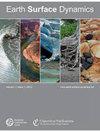非生物控制和生物控制在河道网络发展中的相对作用:按比例潮汐水槽实验的启示
IF 2.9
2区 地球科学
Q2 GEOGRAPHY, PHYSICAL
引用次数: 0
摘要
摘要潮汐沼泽提供了极具价值的生态系统服务,而这些服务取决于分割沼泽景观的潮汐河道网络几何特性的变化。河道网络特性的发展和演变受非生物过程(动态水流-地形反馈)和生物过程(如植被-水流-地形反馈)的控制。然而,人们对生物过程和非生物过程的相对作用,以及在何种条件下二者更占主导地位仍知之甚少。在本研究中,我们通过水槽实验研究了时空植物定植模式对潮汐河道网络发展的影响。我们在潮汐水槽设施中进行了四次模拟潮汐景观发展的规模实验:两次是没有植被的对照实验,第三次是水力植被定殖实验(即通过潮汐流播撒种子),第四次是斑块定殖实验(即在沉积床上直接播种)。我们的研究结果表明,植被实验中的河道网络更密集、更有效,尤其是在植被定殖速度较慢的水力播种实验中。此外,还可以推断出非生物因素和生物因素对河道发展的相互依存关系。生物因素是否影响河道网络的发展似乎取决于水动力的作用力和系统发展的阶段。植被--水流--地貌反馈只在出现中等水动力能量水平的地方对河道发育起主导作用,并且主要在从裸露地貌向植被地貌过渡阶段产生影响。总之,我们的研究结果表明,在潮间带盆地的向海一侧,非生物过程占主导地位,而在向陆一侧,生物过程对系统的发展具有额外的影响。本文章由计算机程序翻译,如有差异,请以英文原文为准。
On the relative role of abiotic and biotic controls in channel network development: insights from scaled tidal flume experiments
Abstract. Tidal marshes provide highly valued ecosystem services, which depend on variations in the geometric properties of the tidal channel networks dissecting marsh landscapes. The development and evolution of channel network properties are controlled by both abiotic (dynamic flow–landform feedbacks) and biotic processes (e.g. vegetation–flow–landform feedbacks). However, the relative role of biotic and abiotic processes, and under which condition one or the other is more dominant, remains poorly understood. In this study, we investigated the impact of spatio-temporal plant colonization patterns on tidal channel network development through flume experiments. Four scaled experiments mimicking tidal landscape development were conducted in a tidal flume facility: two control experiments without vegetation, a third experiment with hydrochorous vegetation colonization (i.e. seed dispersal via the tidal flow), and a fourth with patchy colonization (i.e. by direct seeding on the sediment bed). Our results show that more dense and efficient channel networks are found in the vegetation experiments, especially in the hydrochorous seeding experiment with slower vegetation colonization. Further, an interdependency between abiotic and biotic controls on channel development can be deduced. Whether biotic factors affect channel network development seems to depend on the force of the hydrodynamic energy and the stage of the system development. Vegetation–flow–landform feedbacks are only dominant in contributing to channel development in places where intermediate hydrodynamic energy levels occur and mainly have an impact during the transition phase from a bare to a vegetated landscape state. Overall, our findings suggest a zonal domination of abiotic processes at the seaward side of intertidal basins, while biotic processes have an additional effect on system development more towards the landward side.
求助全文
通过发布文献求助,成功后即可免费获取论文全文。
去求助
来源期刊

Earth Surface Dynamics
GEOGRAPHY, PHYSICALGEOSCIENCES, MULTIDISCI-GEOSCIENCES, MULTIDISCIPLINARY
CiteScore
5.40
自引率
5.90%
发文量
56
审稿时长
20 weeks
期刊介绍:
Earth Surface Dynamics (ESurf) is an international scientific journal dedicated to the publication and discussion of high-quality research on the physical, chemical, and biological processes shaping Earth''s surface and their interactions on all scales.
 求助内容:
求助内容: 应助结果提醒方式:
应助结果提醒方式:


